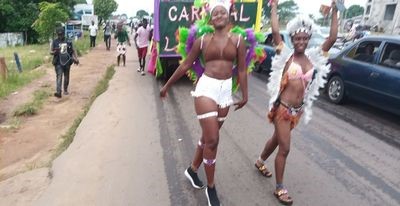PHOTO: Leading the Cultural Carnival: Miss Liberia Wokie Dolo (left) posing for photographers while en route to main celebration venue. (Saturday, December 19, 2020)
By Samuel G. Dweh, Freelance Journalist Contacts—+231 (0)886618906/776583266/samuelosophy@yahoo.com/samuelosophy1@gmail.com
From 10:00am of Saturday, December 19, 2020, current Miss Liberia—Wokie Dolo (crowned in 2017)—began strutting Liberia’s Street as if she was doing ‘Cat Walk’ on the Runway. She had appeared in a less-attention grabbing wears (ordinary blouse, skirt, and sandals) at the assembly ground, but she changed into a “cultural suit”: symbolic crown, body-tight bra (brown), short pant (white), white rubber band tied tight around each leg, and sneakers.
The exposed parts of her body were causing ripple of comments from different religious faiths’ adherents in the marching group and outsiders watching the parade from the sidewalk and in front houses.
She was leading a huge retinue of culture lovers who had honored her invitation for participation in a Carnival. The throng of cultural groups, press people, and mere watchers started from the “Ministerial Complex” (built by the Chinese Government during the Presidency of Ellen Johnson-Sirleaf)—the chosen assemblage point—to the Samuel Kanyon Doe Sports Complex. This distance more than four miles.
Her movement was in rhythm with sounds coming from metal trumpets being aired by members of a hired brass band named “Unity Marching Band”, led by Mickey D. Oldfied.
Continually swaying her waist (as models do on stage), she showed no fatigue as she marched (paraded).
The event was “Liberian Carnival” (Cultural Festival), organized by La Queen Entertainment—founded by the main focus of public’s attention here. The theme of the event—the first of its kind in Liberia—was: “Promoting Unity through Cultural & Traditional Exhibition”
She was humbly accessible to anybody: posing for photo shoot from anybody with phone or camera, allowing selfie (self-photo shoot) with anybody who appealed for or commanded her presence, and pausing to listen to anybody who made a gesture to her for a quick message.
Police officer Bendu Yengbie, of the Highway Division of the Liberia National Police (LNP), was busy with controlling vehicular traffic for the throng of cultural enthusiasts.
All Liberia’s 15 Counties were represented, identified by name on a banner. For those who didn’t have a “County Cultural Troupe”, a group of Monrovia-based natives of the County represented.
Two of the Counties physically present were Grand Kru (President Weah’s County) and Margibi. But only the latter came with masked dancers—popularly called “Country devil” by many Liberians.
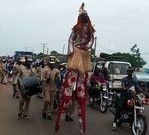
A masked dancer (Gbeingbay), popularly called “country devil”, during parade
Many cultural organizations collaborated with La Queen Entertainment for the realization of its CEO’s “cultural dream”. One was Malawala Balawala, Liberia’s pioneer cultural group founded in pre-war period and had a movie production arm with the same name. The group was the organizer’s Star Partner due to the deep cultural knowledge of its current President—Kekura Kamara, current president of the Liberian Culture Union (LINCU)—who was one of the the star actors in the comic movie “Malawala Balawala”.
“Based on our cultural knowledge covering more than forty years, Miss Liberia called us in to be a major partner,” an official of Many cultural organizations collaborated with La Queen Entertainment for the realization of its CEO’s “cultural dream”.
![]()
Liberia’s cultural icons chatting during the parade. From right: Madison Pailey, VP of Operations, Liberian Culture Union (LINCU); Kekura Kamara, president, LINCU; Victor Taylor, LINCU’s Financial Secretary; Emmanuel B. Lavela, Founder/CEO—School of Liberian Arts and Dance (SLAD)
Another partner is The Liberia Culture Heritage. “Our mission is to promote any kind of positive Liberian culture on a personal level, and to support any group or organization doing same,” Mr. Abraham Ahmed, head of The Liberia Culture Heritage’s representative team, explained to me during the march. “I’m the husband of the Chief Executive Officer, Winnie Goe,” he responded to my question of his position in the organization.
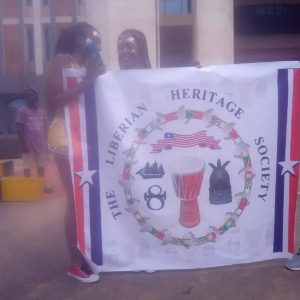
The Liberia Culture Heritage’s banner at the assembly point: Ministerial Complex
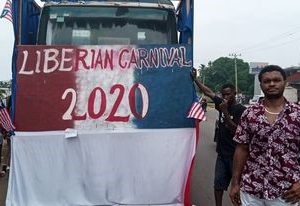
Mr. Abraham Ahmed: Representative of The Liberia Culture Heritage on the Parade Train
The Liberia School of Arts and Dance (SLAD) was another La Queen Entertainment’s partner.
“Our cultural relationship with the now Miss Liberia, Wokie Dolo, started in 2016, when SLAD trained her and other contestants on cultural performances or displays as parts of the criteria for qualification for the Miss Liberia crown pageant. We were hired by Zoobie Cooper, organizer of the Miss Liberia,” SLAD’s Founder/Chief Executive, Emmanuel B. Lavela, told me when the parade was on. SLAD was founded on Ghana’s refugee camp—where Emmanuel was a ‘cultural dancers’—in 2007. “SLAD is composed of adult’s unit and nursery unit of kids trained to continue with my cultural legacy when I and other older members are retired or died.”
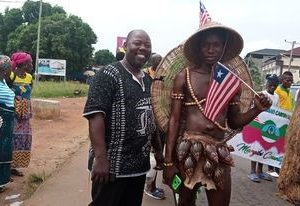
SLAD’s CEO, Emmanuel B. Lavela (left) poses with a participant wearing a ‘skirt’ made from stringed snails
Another partner was Big Town Social Club, a cultural organization that communicates through drumming and singing, based in the Township of West Point, suburb of Monrovia.
Kiddie cultural groups were also part of the event.
One was City of David Culture Troupe, founded in 2018.
The Troupe’s Founder/CEO, Madam Esther W. Tokpah, told me she started cultural dance in the 1970s in Nimba County, and received a cultural dance award from Liberian President William V.S. Tubman after he saw her dancing at an occasion in Butuo, Nimba County, attended by the Head of State.
“City of David Cultural Dance Troupe is a platform for training kids in culturaI dance. As a retired cultural dancer, I founded this platform as my way of reviving Kendeja, Liberia’s decades-old National Cultural Center, which has been sold out to private persons now using the place as residential place and business center,” she told me during the parade.
For a ‘rainbow composition’ of the Carnival, La Queen Entertainment invited a Roller Skate group, “Wolf Riders”, founded by 15-year-old Francis Porley, based on the Old Road (community) on the fringe of Monrovia.
BIRTH OF MISS LIBERIA’S IDEA & SPONSORSHIP.
On when the idea of a “National Cultural Festival” popped up in mind, I couldn’t reach the reigning Miss Liberia personally—in spite of several phone calls (to her personal phone number) and phone calls and phone-based messages to her Personal Assistant Willie Jomah. (During the parade she referred me to the P.A. for her phone and e-mal contacts, after I told her my intention of promoting the Carnival in an article)
“The idea came out two months ago, October” P.A. Willie Jomah responded to first question during one of my intercepted calls, on Monday, December 21, to his boss for an on-phone interview. To my reminder about collaboration on production of a “detailed write-up” (article) that would capture most of the scenes and sounds throughout the parade and at the main celebration venue (which can’t fit in a normal news story), Miss Liberia’s P.A. replied: “She was with me when you called yesterday. She said, since the story has been published in the FrontPage Africa newspaper and other newspapers, it’s ok.”
I sensed one important underlying message in Miss Liberia’s reply—relayed through her Personal Assistant: “He’s using the article matter to beg money from me.”
This is the mindset of (majority) of Liberian celebrities on “persistent reminder” by “strange” writers or Journalist who come out only to “promote” their showcased nation-building ideas.
Unlike celebrities in Ghana and Nigeria, where I lived for 11 and 10 years and survived on Writing as a profession, many Liberian celebrities do not know the importance of “feature article” (900-5,000 words) over “normal news story” (from 300 words) The former contains “descriptions” of the celebrity, his/her costume, works, movement, facial expression (for visual effects)—beyond just narrating to readers through “scanty information” about the celebrity person as the “newspaper rule of writing” requires.
At some point in the parade, long-walk fatigue overwhelmed most of the marchers; some retired into the trailer for a brief rest and stayed in the moving open-top vehicle. Most of those who sought refuge in the Truck were children and elderly people. After a while, some of the younger ones alighted and joined the ‘walking train’.
Miss Liberia looked hopeless when one of the two Trailers broke down at the 72nd Boulevard Junction, opposite the Ministry of Health, in Congo Town. This caused stampede for some of the ‘tired people’ on board—adults jumping off; parents and guardians pulling their children and wards out.
“What happened?” Miss Liberia inquired from two men—operators of the vehicle—under the car, pulling white clothes from irons beneath the engine.
“The trailer just stopped, and we met these clothes around the shaft,” one of the men replied to Ms. Dolo’s question.
“Can you cause the Trailer to move again?” Miss Liberia asked again.
“Yes, but it will take some time,” the operator answered.
Miss Liberia left to join the throng of marchers, continuing with ‘cat-walk’ type of movement, her comely facial expression concealing her internal uneasiness from the mechanical condition of the ‘conveyance vehicle’.
The marching train reached at the Samuel Kanyon Doe Sports Complex. The time was 2:25pm as revealed by my mobile phone’s watch. The distance covered—from the Ministerial Complex to here—was over six hours.
The performance stage had been set in front of the front gate of the Sports arena. Various cultural productions were on display in a line adjacent the performance stage.
While the event organizer was preparing to begin the main program, I decided on speaking with persons with displayed cultural products.
I started with first table containing cloth bags.
“The name of my company is Sareta Lynn, and I’m the CEO, Chief Executive Office,” replied Ms. Cyrene Jones, owner of the table, to my first question. “I started this business in the United States of America, where I was trained as a designer in African traditional products and became a teacher in what I learnt.”
The second table contained bananas, pineapples, and melons and three glass pitchers with juices.
“These juices are made from Liberian cultural fruits you’re seeing on the table,” explained Ms. Frances M. Konneh, age 24, a student of the Business Department of the Stalla Maris Polytechnic University (adjacent the University of Liberia) on Capitol Hill, Monrovia. “On health, fruit’s juice is good for the human’s body, especially to reduce obesity and to fight Pressure or Hypertension.”
Madam Alfreda Mayson, CEO, sat behind the third table containing various cloth bags and a foot-wiping “rug” made from tiny pieces of cloths.
“My company’s name is Jola House of Fashion, founded in 2012, and based in Bernard’s Farm, outside Monrovia,” she replied to my first two questions. To the third question, “Why are into this economic venture?”, she replied: “I’m working in a school, but I make these things as alternative source of income. A wise person doesn’t depend on one job to survive.”
Gifted Hands Designs, founded by Ms. Albertine Mensah (age 23), founded in December, 2018, was the fourth business on the line of different cultural economic ventures. There was a variety of products—table lamps, photo frames, shoulder bags, etc.
“I started this business when I became fed up with working for people, each of whom exploited me in several ways,” Ms. Mensah replied to my inquiry of why she decided to do what she was displaying at the Carnival.
Pauline and Prayer Multi Purpose Business Center was the fifth on the line. Its products were ‘household materials’—buckets, photo frames, spoons, kitchen knives, etc.—made from cloth.
“I started this business in 2014, during the Ebola time in Liberia, when I finally decided to never depend on a man for my needs,” Mary Wombo, owner of the business, replied to my questions. She was with her little daughter when I spoke to her.
The last ‘cultural product’ on the line was cooked food—the only kind—and owned by the male business person. In a white culinary uniform, he was standing few meters from a table containing four aluminum chafing dishes and assortments of food seasonings and service materials. A team of young men and ladies—in the same culinary uniform as the lone man—stood behind the table.
“My name is Thomas Nyanneh, I’m the Founder and Chief Executive Officer of Thomas Catering Services—a Liberian cultural foods business here. One of our delicacies, today, is snail barbecue,” the man standing alone explained to me, and asked me to have a “free taste” of any of the foods.
“Thank you for the offer; I will come back later for your offer,” I responded, but never came back.
The main phases of the La Queen Entertainment’s visualized (National) Cultural Festival were two phases: Remarks and Displays—vocals and dance.
The first remark came from the Minister of Youth and Sports, Zeogar Wilson, representing the Government of Liberia.
“This is the first national cultural festival in Liberia. We thank La Queen Entertainment and its partners for such great innovation. We will support the next edition of the Carnival and make it a part of the National Sports Festival,” Minister Zeogar said.
The CEO of La Queen Entertainment, the next speaker, appealed to Liberians to support Liberian culture in general, and the next edition of the Carnival.
“Don’t sit over the fence. Support and attend festivals, which is more than going to Pool game or Beer Club,” she added.
The president of La Queen Entertainment’s major partner on the 2020’s National Cultural Festival, Malawala Balawala, Mr. Kekura Kamara, explained to me in an exclusive interview: “Liberia has a rich culture, but the Country’s cultural heritage has not been publicized enough over fifteen years, since the end of the civil war. Every Liberian has the patriotic obligation of promoting this common heritage, in spite of his or different political differences with the person or a group of people spearheading exhibition of the Country’s cultural festival.”
For performance, the organizers started with the Culture Troupe of Grand Kru County—President George Manneh Weah’s Native Home.
Grand Kru, represented by men and women attired in yellow-and-green suit, performed with a song entitled “Peace”, calling for “Peace in Liberia…in the Mano River Union…in Africa…and the World.
Other Counties’ Culture Troupes exhibited their cultural talents.
On the individual adult private cultural group, Big Town Social Club (Culture Troupe) and the School of Liberian Arts and Dance did their respective displays. The latter did “Mandingo Dance” with “Mandingo song” (titled “It’s because of you we are her”)—common with the Mandingo tribe fond in the Quadu Gboni District of Lofa County—North-Western part of Liberia.
From the Kiddie Culture Troupe, City of David Culture Troupe, the “Nurse ry Unit” of the School of Liberian Arts and Dance (SLAD) showed their cultural juices with songs and dance.
PRESIDENT GEORGE MANNEH WEAH’S COMMENTS ON THE EVENT
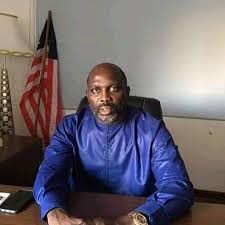
Liberia’s Head of State George Manneh Weah
The Liberian Head of States commented through his social media page on December 20. Full comment reproduced below.
“I wish to congratulate the organizers of the just ended cultural carnival, which marked the first time such an event is holding in the Country. The ceremony presents an innovative way of uniting Liberians using their culture, while also developing artistic talents and improving the economy.
La Queen Entertainment, its CEO and other partners can be assured of my fullest support for all such initiatives that promote the Country’s culture and artists.
I urge all Liberians to emulate the example of the organizers by taking pride in their cultural heritage.
May the festival grow from strength to strength and become an annual affair, as the idea resonates with more people.”
A member of one La Queen Entertainment’s organizing partners told me on the eve of the Carnival that the George Weah-led Government had not released any cash as contribution to the Carnival. “Even during the partners’ last meeting day, on the eve of the celebration, we never received communication from the Government on our request for support sent to the Government weeks ago. None of the individual top members of the ruling Coalition Democratic Party we wrote for support responded with money,” disclosed the source on condition that his name won’t be disclosed, which would engender “bad feeling from the President Weah toward my organization,” the person added.
On September 26, the George M. Weah’s Government celebrated the “World Tourism Day”—ahead of the globally celebration day, on September 27,–at the Providence Island—Liberia’s Cultural Site. In his speech to the Seventy-fifth (75th) Meeting of the United Nations General Assembly (for Year 2020), President Weah stated ‘prioritization of Liberia’s culture promotion’ as one of the goals of the Government.
I couldn’t reach the President or any top member of the Government to react to the allegation
Another official of a different La Queen Entertainment’s partner on the Carnival told me a reason that could be the cause of lack of support from the Government and individual member of the ruling party. “The Party’s shocking loss of the Senatorial Election in Montserrado County and most of the other Counties is still fresh on the heart of the President and each of the other party’s members approached to support the Carnival, so they weren’t in the right frame of mind to release money,” the person assumed.

